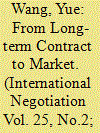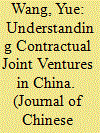|
|
|
Sort Order |
|
|
|
Items / Page
|
|
|
|
|
|
|
| Srl | Item |
| 1 |
ID:
172322


|
|
|
|
|
| Summary/Abstract |
The collapse of a long-term contract-based (LTC) benchmark system and the rise of a market-based index system in international negotiations of iron ore prices in the Asia-Pacific region has attracted much media attention. However, a systematic analysis of why and how such a change occurred from a negotiation point of view is absent. Drawing upon a relationship-behavior-conditions (RBC) perspective from the international business (IB) negotiation literature, this article investigates how negotiations between parties unfolded during the 2009–2010 period. Specifically, the article contributes to a deeper understanding of the subject by evaluating the relationships between various negotiating parties, investigating some intriguing behaviors by negotiating parties, and identifying important conditions surrounding the negotiation process. The case of iron ore price negotiation also offers a vehicle to advance the RBC perspective in untangling complex IB negotiation problems and generate some broad implications for IB negotiation research and practices.
|
|
|
|
|
|
|
|
|
|
|
|
|
|
|
|
| 2 |
ID:
171151


|
|
|
|
|
| Summary/Abstract |
After Asian financial crisis, the Japanese government quickly adjusted its foreign economic policy and, unlike their traditional image of inaction, actively carried out and led the crisis rescue work through separate policies. The introduction and implementation of the “New Miyazawa Initiative” represented that the focus of the Japanese government has shifted to the preparation for and construction of the regional local currency bond market. This was backed by the strategic consideration to restart yen internationalization (or yen re-internationalization). It reflects the Japanese government’s reflection and adjustment on the path selection of promoting the internationalization of yen in the early stage. Relying on such change, The Japanese government intended to foster regional yen bond market to build yen backflow mechanism in East Asia and to realize the long-term objective of yen internationalization through “regionalization.” On the twentieth anniversary of Asian financial crisis, this paper re-examines the change to yen internationalization strategy, which is of practical significance for other cases’ attempt to internationalize local currencies as RMB internationalization at present. With reference to the strategic change in yen Re-internationalization, RMB internationalization shall shift the focus from “trade settlement” in the past to “capital outflow” through fostering the regional RMB bond market, expand RMB backflow mechanism. China shall focus on Asian Infrastructure Investment Bank (AIIB) and other new regional financial cooperation platforms to promote RMB regionalization, thus finally realizing the strategic objective of RMB internationalization. Nevertheless, this path selection is inseparable from China’s positive attitude toward financial and capital liberalization.
|
|
|
|
|
|
|
|
|
|
|
|
|
|
|
|
| 3 |
ID:
077190


|
|
|
|
|
| Publication |
2007.
|
| Summary/Abstract |
Contractual Joint Ventures (CJVs) in China have been under-studied despite their importance as one of the three major forms of foreign direct investment (FDI) prescribed by the Chinese government. Based on first-hand survey data and within a transaction cost-comparative institution framework, the paper conceptualizes the nature of CJVs as a relational subcontracting arrangement rather than a form of FDI. Formed mainly between Hong Kong and Chinese manufacturing firms in the South China province of Guangdong, CJVs display quasi-market and quasi-hierarchy features, sitting between Processing and Assembling arrangements (P&As) on the one hand and Equity Joint Ventures (EIVs) and Wholly Foreign Owned Enterprises (WFOEs) on the other. The theoretical and practical implications are discussed.
|
|
|
|
|
|
|
|
|
|
|
|
|
|
|
|
| 4 |
ID:
143904


|
|
|
|
|
| Summary/Abstract |
Developed mainly in the broad field of negotiation, the existing literature on international business negotiation has adopted theoretical perspectives that focus on differences between negotiating parties. In this article, we argue that opportunism is more fundamental than differences in our understanding of international business negotiation behavior. Parties’ concerns over how to mitigate opportunism are the fundamental force that drives such negotiation behavior, and the likelihood of opportunism is affected mostly by the economic nature of the asset parties committed to the business exchange. By synthesizing transaction cost economics and new institutional economics, this paper develops an alternative theoretical model that complements the existing negotiation literature to explain negotiation behavior. Our model theorizes relationships between parties’ ex-ante credible commitments and ex-post dispute resolution strategies and explores how institutions moderate such relationships in shaping international business negotiation behavior and process.
|
|
|
|
|
|
|
|
|
|
|
|
|
|
|
|
|
|
|
|
|